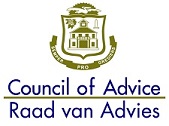The task of the Council of Advice
HISTORICAL BACKGROUND
The Council of Advice has existed since October 10th 2010, the day on which the former Netherlands Antilles ceased to exist and Sint Maarten attained its Country Status within the Kingdom of the Netherlands. Just like Aruba in 1986, Sint Maarten and Curaҫao received this new status. While the other remaining islands, Bonaire, Sint Eustatius and Saba became Public bodies belonging to the Netherlands. With this new autonomous status, Sint Maarten gained a Constitution, along with the High Councils of State, the Council of Advice falling thereunder.
The function of the Council of Advice was executed prior to October 10th 2010 by the Council of Advice to the Netherlands Antilles. The Task of the Council of Advice is derived from the task of the department of Advice of the Council of State of the Netherlands that has a long history dating back to the year 1531. For more information on their history please visit their website:
History of the Council of Advice Netherlands Antilles
PROVIDING ADVICE
The Council of Advice is tasked with providing the Government and Parliament with advice regarding legislation and administrative actions. Together with the Parliament, General Audit Chamber and Ombudsman, the Council of Advice is referred to as one of the High Councils of State. We are a part of the system of checks and balances provided for in the Constitution of Sint Maarten. The High Councils of State are institutions established by the Constitution and are independent from Government with regard to the execution of their powers.
Based on the Constitution the government has an obligation to request the Council to give an advice about all draft proposal legislation, specifically draft National Ordinance and National Decrees containing general measures issued by the Government, [1] the Government of the Kingdom [2] and proposals for approval of the Treaties that have binding effect in Sint Maarten. Parliament is obligated to hear the Council on initiative legislation coming from one or more Parliamentarian. The so called initiative National Ordinance.
Furthermore the Council is obligated to advise on all matters that are considered necessary by Government and in instances that are prescribed by law. For example the Council advises the Prime-Minister about unwanted commercial affiliation (interest), conflicting secondary functions and activities based on the National Ordinance promotion of the integrity of ministers. The Council also has the authority to, on its own accord, issue advices to Government and Parliament. These advices are called unsolicited advices.
With regard to the National Ordinances where Parliament and Government form the highest legislator, a request for review should be sent to the Council of Advice before submission for adoption and ratification by Parliament. In case of an Initiative National Ordinance, before the draft legislation is submitted to the Central Committee of Parliament for debate [3]. Legislation that is approved by Government without the involvement of Parliament is referred to as a National Decree containing general measures and it also is submitted to the Council before it can be ratified by Government. With its Further Report government responds to the Council’s advice. It is essential in the Further Report that the points not taken over by the Government should be addressed and sufficiently justified. [4]
STRUCTURE
The Council consists of five members including a vice-chairperson and 5 extra-ordinary members. At the moment the Council has three extra-ordinary members that also function as replacement Council members and can prepare pre-advices to the Council. The Governor can fill his position as Chairperson at any time and whenever he deems it fit to do so. As chairperson he has an advisory role. The vice-chair, the rest of the members and extra-ordinary members are appointed for seven years and can be reappointed. Sint Maarten's appointed member of the Kingdom's Council of State is an extra-ordinary member of the Council and may be present for the meetings held by the Council. Presently, Sint Maarten has not appointed a member to the Kingdom's Council of State.
The chosen structure of the Council strives to encompass a wide section of the political and social spectrum. Collectively the members have a wide range of political, administrative and legal expertise. The Council does not function as a specific expert council but rather as a general advisor. The Advices of the specialized councils with expertise in their fields form part of the dossier that the Council of Advice receives as final and highest advisor to government.
[1] Draft National Ordinance and National Decrees containing general measures
[2] Draft Kingdom Act and Decrees
[3] Here it pertains to draft National Ordinances
[4] Here it pertains to draft National Decrees containing general measures
